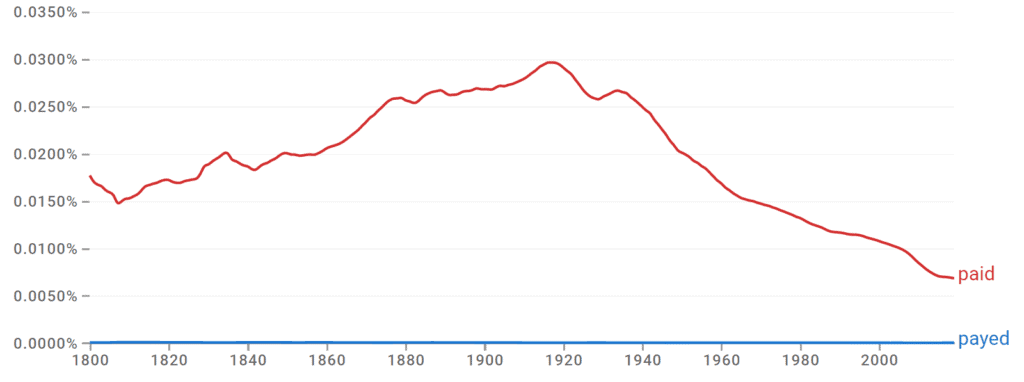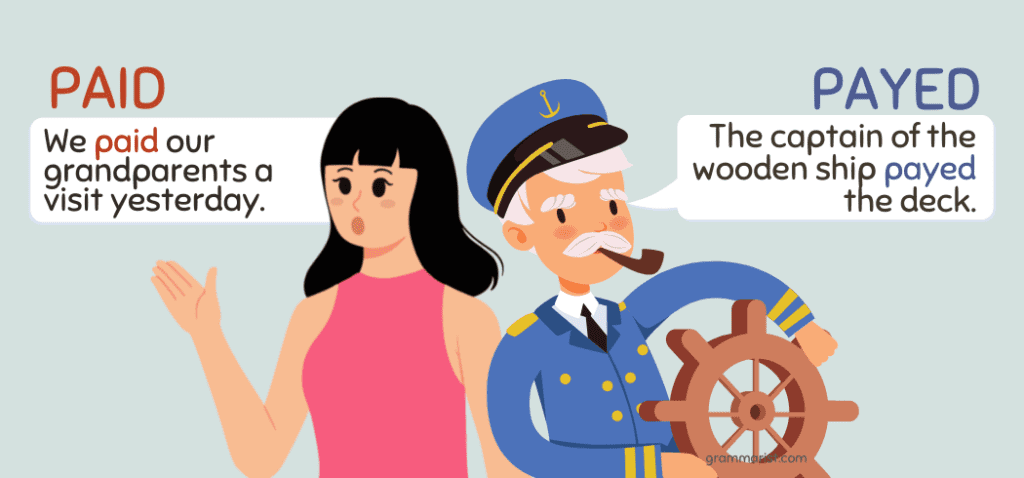Payed and paid have the same pronunciations but different meanings. One can be used in nautical contexts, while the other has something to do with finances. Learn the difference between paid and payed with sentence examples in this article.
Payed vs. Paid
Payed and paid have the same pronunciations but different meanings. Paid is the correct spelling of the simple past tense and past participle form of pay. It’s an irregular verb, meaning it does not end in -ed.
Meanwhile, payed is a rare word that is only used in the realm of marine. It refers to the act of coating parts of a boat with waterproof material. It is not the simple past tense or past participle form of pay.
Payed Uses
Payed sometimes applies as the past tense of pay, but not for pay that means to transact. It is the simple past tense of pay, which means to use the pitch as a seal to prevent leaks. Consider this sentence example.
- The sailor payed the creases to make the boat seaworthy.
Paid Uses
Paid is the simple past conjugation and past participle form of the verb pay. It is a Latin word that found its way into English through paier. Originally, it means to pacify. Today, the word pay means to give someone money that is due for work done. For example:
- I paid $300 to have this cabinet built.
The word pay also means to suffer a loss or other misfortune as a consequence of an action. For example:
- She paid for her impatience.
Pay also means to give or bestow, usually some sort of attention or respect. For example:
- We paid our grandparents a visit yesterday.
Paid can also be an adjective when in past participle form. We usually find this word before a noun. For example:
- All our paid taxes will contribute to the building of bridges and roads in the city.
Phrases That Use Payed and Paid
There are no common phrases with the word payed. But there are a few expressions and idioms with paid you can consider. Here are some of them.
- I’ve paid my dues, which means the speaker has earned the right to a few benefits by putting in the time.
- She has paid her dues over the last 30 years. Now she can happily retire.
- Paid in full, which means someone has completed their payment for something.
- The documents show that their bill has been paid in full.
- Pay (one’s) respects, which means expressing well wishes or offering sincere condolences.
- The employees are coming to pay their respects to the late supervisor.
- Robbing Peter to pay Paul, which means taking money for something and putting it somewhere else.
- Miranda moved money from her college savings account to her main account, robbing Peter to pay Paul.
Examples of Payed Used in a Sentence
- The captain of the wooden ship payed the deck.
- The yacht looks amazing but should be payed.
Examples of Paid Used in a Sentence
- You should have paid attention to the speaker yesterday.
- This house is already paid for in full.
- Twitter’s paid-for verification feature is rolling out once again on Monday. It was paused last month after being swamped by impersonators. (BBC)
- Railroad workers could get the paid sick days that were at the heart of their threat to go on strike – if the Biden administration steps in with an executive order. (CNN)
- The boss of easyJet was paid almost £3m in 2022, in the year when the airline made a £208m loss and cancelled thousands of flights because of staffing and other problems. (The Guardian)
How to Remember the Difference and Correct Form
Picking the correct spelling shouldn’t be complicated. Remember that pay is an irregular verb, which means the simple past form does not follow the typical pattern. It should not end in -ed. Instead, we change the letter y to i and add d.
You can associate it with the personal pronoun I by saying that I have to make sure I pay my debts.
Is It Payed Off or Paid Off
The correct term is paid off. This phrasal verb is an informal term that means to yield good results or to succeed. Here’s an example.
- All her perseverance paid off after getting a promotion.
Paid off also means to pay a debt in full. For example:
- My parents paid off their mortgage.
Is It Paid or Payed Attention?
The correct term is paid attention. The verb means to watch, listen to, or think about someone carefully with interest. For example:
- We paid attention to his speech last night.
Final Word on Paid vs. Payed
Payed and paid are pronounced similarly. They are also the simple past and past participle forms of the verb pay. But they have different meanings.
Remember:
- Payed is the past form of pay, which means to coat boat parts with waterproof material.
- Paid is the simple past and past participle forms of pay, which means to exchange money for goods or services.



Comments are closed.